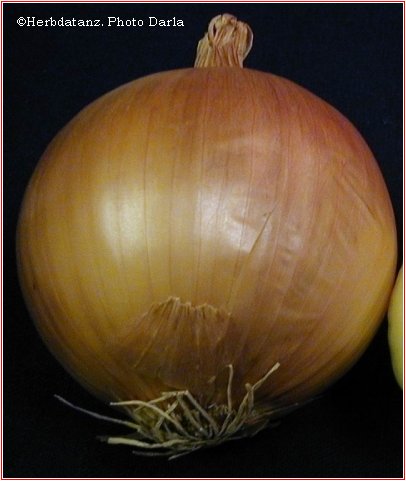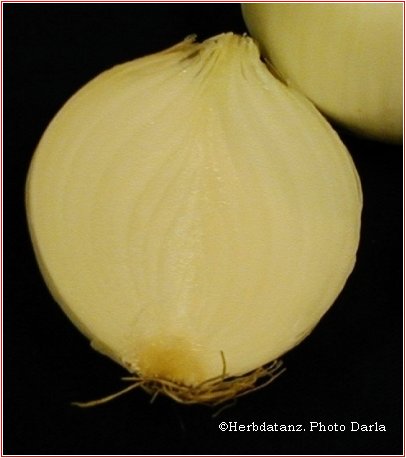

The Venerable Onion.
By
Ivor Hughes
Introduction.
So pervasive, so common, there is
not a nation that does not employ it in their culinary arts. From East to
West it is an essential part of the domestic economy and has been across the
centuries. Consumed by Lords and Ladies, artisan and peasant. Cooked or
uncooked
1. The USD 1926. Part 2.
2. Boerickes Materia Medica
(Homeopathic)
3. Culpeper�s Complete Herbal.
1.
(Fam. Liliaceae.) Fourcroy and Vauquelin obtained from the ordinary onion a white, acrid, volatile oil containing sulphur; also albumen, much uncrystallizable sugar and mucilage, phosphoric acid, both free and combined with lime, acetic acid, calcium citrate, and lignin.The expressed juice is susceptible of the vinous fermentation. The oil is essentially the same in chemical composition as the oil of Allium sativum L., and consists largely of allyl sulphide, (C3H5)2S. (See A. Pharm.,1892, 434.) Perkin and Hummel found quercetin in the outer skin of onion bulbs, and the skins have been used in dyeing. The onion is sometimes used in domestic medicine as an expectorant in sub acute bronchitis, and the onion poultice is sometimes employed as a mild irritant.

A picture of coryza, with acrid nasal discharge and laryngeal symptoms, eye secretion bland; singers cold, worse in warm room and toward evening; better in open air is presented by this remedy. Specially adapted to phlegmatic patients; colds in damp cold weather. Neuralgic pains, like a fine thread, following amputations or injuries to nerves. Traumatic chronic neuritis. Burning in nose, mouth, throat, bladder and skin. Sensation of glowing heat on different parts of the body.
Head. � Catarrhal headache, mostly in forehead; worse in warm room towards evening. Thread like pains in face. Headache ceases during menses; returns when flow disappears.
Eyes. � Red. Much burning and smarting lachrymation. Sensitive to light. Eyes suffused and watery; profuse, bland lachrymation, better in open air. burning in eyelids.
Ears. � Earache, shooting in Eustachian tube.
Nose.� Sneezing, especially when entering a warm room. Copious, watery and extremely acrid discharge. Feeling of a lump at root of nose. Hay fever. [Sabad.; Sil.; Psor.] Fluent coryza with headache, cough, and hoarseness. Polypus.
Stomach.� Canine hunger. Pain in pyloric region Thirst. Belching. Nausea.
Abdomen.� Rumbling, offensive flatus. Pains in left hypo-gastrium. Colic sitting, moving about.
Rectum,� Diarrhoea "with very offensive flatus. Stitches in rectum; itching and rhagades in anus. Glowing heat in rectum.
Urinary � Sensation of weakness in bladder and urethra. Increased secretion of urine with coryza. Urine red with much pressure and burning in urethra.
Respiratory.� Hoarseness. Hacking cough on inspiring cold �air. Tickling in larynx. Sensation as if larynx is split or torn. Oppressed breathing from pressure in middle of chest. Constricted feeling in region of epiglottis. Pain extending to ear.
Extremities.� Lame joints. Ulcers on heel. Painful affections of fingers about nails. Neuralgia of stump. Bad effects from getting feet wet. Limbs, especially arms, feel sore and tired.
Sleep.� Yawning with headache and drowsiness. Gaping in deep sleep. Dreams. Wakes at 2 a.m.
Modalities.� Worse, in the evening, in warm room. Better, in open air, and in cold room.
Relationship.� Compare: Gels.; Euph.; Kalihyd.; Aconite, Ipecac.
Complementary: Phosphor.; Thuja; Puls.
Antidotes: Arn.; Cham.; Veraf.
Dose.�Third potency.
3. Culpeper�s Complete Herbal.
Onions. They are so well
known that I need not spend time about writing a description of them.
Government and virtues; Mars owns them, and they have gotten this quality, to draw any corruption to them, for if you peel one, and lay it upon a dunghill, you shall find it rotten in half a day, by drawing putrefaction to it; then, being bruised and applied to a plague sore, it is very probable it will do the like.
Onions are flatulent, or windy; yet they do somewhat provoke appetite, increase thirst, ease the belly and bowels, provoke women's courses, help the biting of a mad dog, and of other venomous creatures, to be used with honey and rue, increase sperm, especially the seed of them.
They also kill worms in children if they drink the water fasting wherein they have been steeped all night. Being roasted under the embers, and eaten with honey or sugar and oil, they much conduce to help an inveterate cough, and expectorate the tough phlegm. The juice being snuffed up into the nostrils, purges the head, and helps the lethargy, (yet the often eating them is said to procure pains in the head). It hath been held by divers country people a great preservative against infection to eat Onions fasting with bread and salt. As also to make a great Onion hollow, filling the place with good treacle, and after to roast it well under the embers, which, after taking away the outermost skin thereof, being beaten together, is a sovereign salve for either plague or sore, or any other putrefied ulcer.
The juice of Onions is good for either scalding or burning by fire, water, or gunpowder and used with vinegar, takes away all blemishes, spots and marks in the skin: and dropped in the ears, eases the pains and noise of them. Applied also with figs beaten together, helps to ripen and break imposthumes, and other sores. Leeks are as like them in quality, as the pome water is like an apple.
They are a remedy against a surfeit of mushrooms, being baked under the embers and taken, and being boiled and applied very warm, help the piles. In other things they have the same property as the Onions, although not so effectual.
Nicholas Culpeper. Herbalist. 1653.